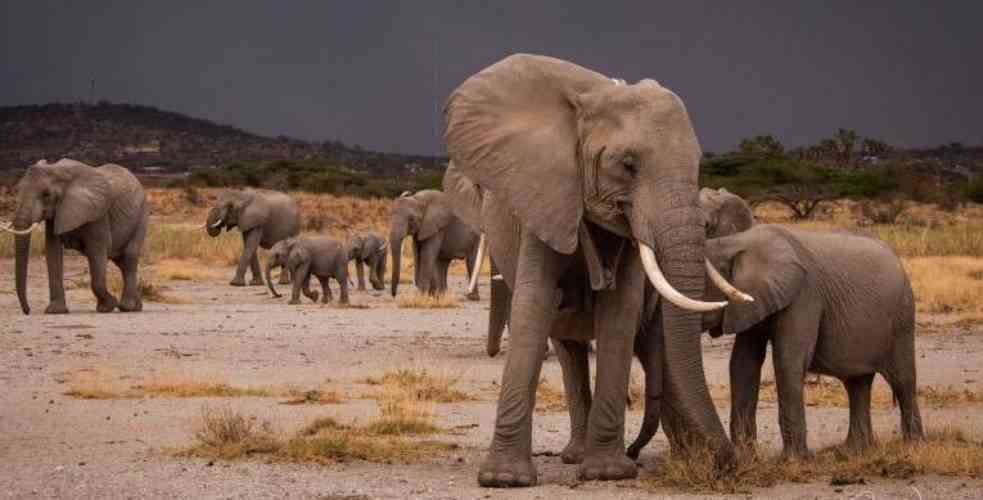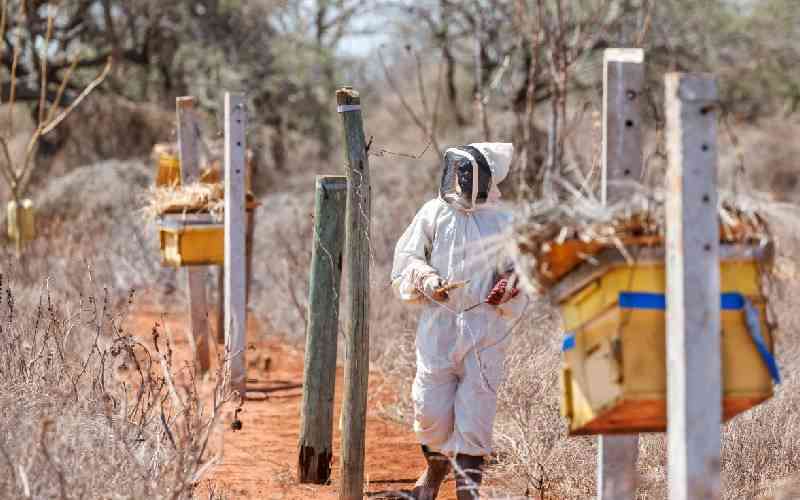
Elephant herd at their natural habitat in Samburu National Reserve where a mother elephant named Alto gave birth to twins. [Courtesy]
Kenya has made global headlines for its wildlife conservation efforts after a female elephant named Alto gave birth to healthy twin daughters in Samburu National Reserve last week.
This is a rare occurrence, as the chances of twin births among elephants are only one percent, according to experts.
Alto and her newborn calves were spotted by Save the Elephants, a conservation group that monitors the elephant population in the reserve.
They shared a video of the happy family on their Facebook page, saying, "Amazing odds! Almost two years after Bora from the Winds gave birth to twins for the first time in decades, Alto from the Clouds has done it too."
However, the group also noted that Bora's twins, a male and a female, did not survive as they were born during one of the worst droughts in the region.
"Despite her excellent mothering skills, the female twin sadly died," they said.
They expressed optimism that Alto's twin daughters have a better chance of survival as they were born when the reserve was lush and green, thanks to the recent rains.
- Health crisis persists as lab technicians' strike enters day 53
- Kenya and China eye deeper collaborations in traditional medicine
- Expert: Health CS nominee welcome but...
- Cartels, graft at Health ministry will test nerve of Dr Barasa
Keep Reading
"Alto should be able to produce plenty of milk to feed her hungry brood, plus she also has the amazing support of her herd," they said.
Samburu National Reserve seems to be a fertile ground for twin-delivering mother elephants.
The last recorded twin birth in the reserve was in 2006, according to data from the Kenya Wildlife Service.
The reserve is home to about 900 elephants, which face threats from poaching, human-wildlife conflict, and habitat loss.
The news of Alto's twins comes as a ray of hope for Kenya's elephant conservation, especially after a gloomy report by the Ministry of Tourism earlier this month that drought had killed 205 elephants between February and October, during one of the worst droughts in 40 years.
"The areas to the north and south of Kenya are most affected by the drought and are also home to the bulk of Kenya's elephant population," the report said.
The ministry recommended providing water, salt licks, and food for vulnerable wildlife groups and increasing monitoring and data collection.
Elephants are the largest land mammals on earth and need to eat about 150 kg of food per day to sustain themselves.
They usually give birth to one calf at a time, after a gestation period of 22 months. Twins are very rare and often face difficulties competing for their mother's milk and attention.
Being the largest mammals on earth, it is therefore not surprising that their gestation period is close to two years.
African elephants have the longest gestation period of any living mammal, carrying their young for nearly 22 months and giving birth roughly every four years, while for the Asian elephant, it is between 18 and 22 months.
Interestingly, nothing about the elephant is small, and their pregnancies are no exception. Mother elephants give birth to a 110-kilogram calf, which means both Alto and Bora had to carry the 220 kg weight of their unborn calves before birth. This is no mean accomplishment.
Most female elephants become pregnant and give birth for the first time between 14 and 15 years old. They can give birth between ages 16 and 40, although it is on record that an elephant can give birth at age 60.
Last month, the charity Save the Elephants said that one famed calf, well-known for being a twin, a rarity for elephants, died during the drought.
 The Standard Group Plc is a multi-media organization with investments in media platforms spanning newspaper print
operations, television, radio broadcasting, digital and online services. The Standard Group is recognized as a
leading multi-media house in Kenya with a key influence in matters of national and international interest.
The Standard Group Plc is a multi-media organization with investments in media platforms spanning newspaper print
operations, television, radio broadcasting, digital and online services. The Standard Group is recognized as a
leading multi-media house in Kenya with a key influence in matters of national and international interest.











